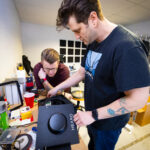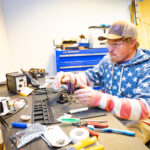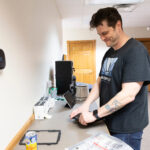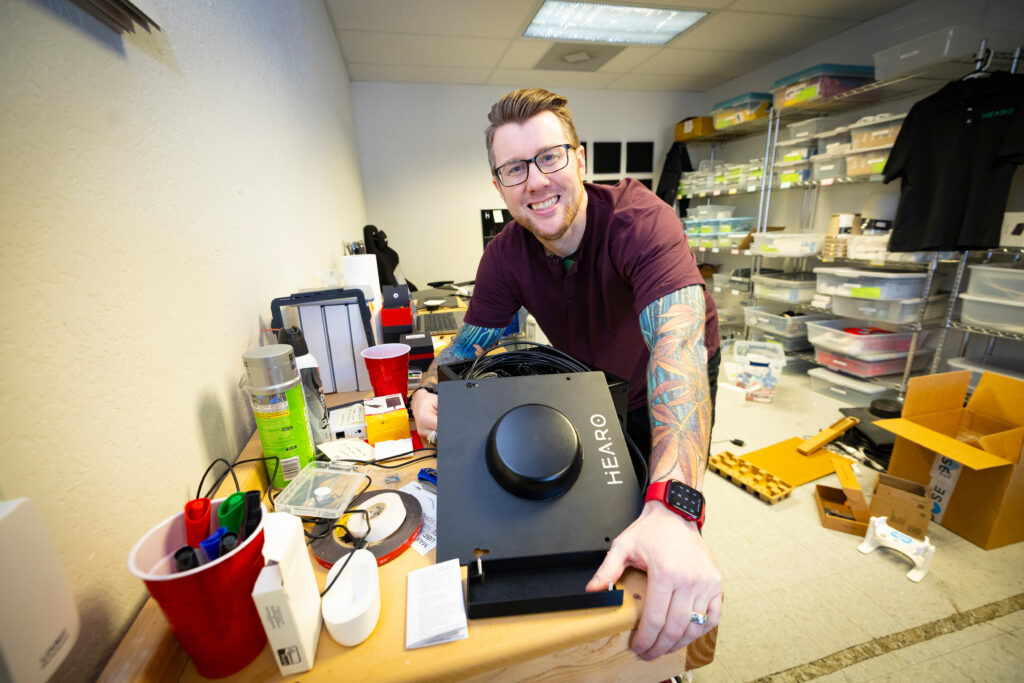- Date published
HEARO innovates independence and is poised to be a game changer.
Smart home, sure. Everyone’s familiar. But some of that is frustrating, too technical or expensive. It can also save lives or prevent major catastrophe – especially when we’re talking about vulnerable populations, like the aging population or those with a developmental disability (DD).
“What HEARO brings to the table is engineering and technical knowledge and an understanding of how that can be used to improve the lives of the individuals in this space,” said Myke Bates, CEO and co-founder of HEARO, an efactory alumni company.
HEARO focuses on building technology that can improve independence and identify safety threats in a home. That can look like a lot of different gadgets and gizmos, but primarily, it’s all about monitors, reminders and integration with healthcare personnel or caregivers.
History
Bates cofounded Eagle Speak alongside Jason Arend in 2015. They participated in the first efactory accelerator program, and through the accelerator, they connected with Jim Carr, who became a primary investor (and CEO until 2023).
“Eagle Speak – what we wanted to do was create a really nice native desktop chat application for quickly starting or joining a voice/video chat and seamless file and screen sharing. And just basically buck the norm of every chat system that existed out there,” he said. “This was in a pre-COVID world when the best thing going was Skype.”
Through connections at efactory, Eagle Speak met Tim Dygon from Arc of the Ozarks. A long-time efactory partner, Arc of the Ozarks specializes in giving the DD population independence. It wasn’t long before Carr and the Eagle Speak team began riffing about how more technology could be infused into addressing issues he saw.
When you meet Bates, it’s not surprising that they jumped on this idea. He’s quick on his feet, rapid-fire in fact, and with an ad agency background, he’s used to brainstorming. This background, plus a deep knowledge of the tech side, made Eagle Speak, and now HEARO, incredibly nimble.
“We got some sensors, started prototyping them real quick, then slapped together a proof of concept and showed it to Tim,” he said.
Dygon told them, “If this can exist, companies like Arc of the Ozarks and plenty of other organizations would be excited. This is sorely needed.”
Not only that, he suggested getting it in front of the Missouri Department of Mental Health, who were also quite impressed.
Seeing this potential, but without really intending to do so, the Eagle Speak team just began investing all their energy into Hearo. You could say they put all their bytes in one cloud.
Then, in 2019, Hearo bought out Eagle Speak.
“It wasn’t as if we even made a specific decision to stop working on Eagle Speak. Hearo was just too perfect not to pour all our efforts into. Eagle Speak is still technically owned by HEARO,” Bates added.



Difference makers
Now as HEARO, they’re hearing all the success stories from caregivers. Here’s just one story:
“As one of her caregivers, I have seen so much progress over the weeks of using the HEARO system,” said one caregiver from a local agency.
In this case, the individual needs reminders to complete tasks, such as to take medication or turn appliances off, as well as safety reminders, like to use a walker in the home. The individual can get irritated if these reminders interrupt her daily regiment of television shows and her tendency has always been to quickly dismiss similar alarms.
But HEARO allows caregivers to personalize the experience, using consistent voice reminders and simple technology that’s integrated into the home. For example, it can remind her to not tap the tablet screen until she’s actually swallowed the pill. In her case, she has severe dementia and needs many reminders daily to keep her safe and to give her context about her circumstances.
It’s so personalized that the caregivers have programmed Perry Mason trivia into her day. The repetition of the trivia is working in improving her memory. Recently, she turned around and recited a piece of this trivia to her speech therapist. Through the stories her caregiver shares, it’s obvious HEARO is giving more than television breaks to this client. It’s feeding her brain, and she is proud of the new facts she’s learning. All in all, it is helping her to maintain a sense of individuality and independence.



